Finally, you can find the answer to any topic that I didn’t write about on other pages in here.
Why Do Governments Dislike Bitcoin Mixers?
Governments have a thing against bitcoin mixers because bad guys use them from crime. There’s no conspiracy theory about governments trying to dismantle Bitcoin or anything like that, but there are salty bank chairmen who’d like to. For the most part, politicians around the world actually see the benefits of cryptocurrency and a global crypto economy. A few more would agree with this bitcoin mixer list.
Unfortunately, there are also a lot of politicians from the old, pre-technology age who do not understand crypto. They are advised by lobbyists with often-malicious intentions, and also quick to make judgments about it. Examples should be quite obvious since you can read them in the news on a near-daily basis. So this is where the majority of negative crypto action comes from.
Bitcoin mixers, and for that matter, CoinJoin wallets and exchanges, are all abused by criminals, and that is not going to change anytime soon, if ever. But the last thing we need is complete, Orwellian surveillance over our digital transactions. That is why people make bitcoin mixers. (The other reason is that it is a very profitable business model.) Even the wallets that implement blacklisting do so begrudgingly, because the natural evolution of that is to decide who gets to use your service and who can’t. (Like PayPal.)
Which Is Most Private: Mixers, exchanges, or CoinJoins?
By far and away, the most private method for anonymizing your Bitcoins is by using CoinJoins, followed by exchanges, followed by mixers. The reason behind this is simple: CoinJoins use a built-in feature of the protocol and thus leave little trace. Exchanges use ordinary transactions, but if sent between exchanges via Monero, offer equivalent anonymity, but it’s slightly harder to do. Mixers are centralized, and you need to trust them to not keep logs and to set up their sites properly. And there is the risk that they might be a honeypot.
Although as I wrote earlier, all of these methods must exist for Bitcoin to be healthy. Because without bitcoin mixers, it becomes much easier for compliance departments of major crypto services to take para-legal action to damage the adoption of privacy on Bitcoin.
How Does A Bitcoin Mixer Work?

Most modern bitcoin mixers create a session for each user. Each one calls it a different name, but they all look something like the one showed in this picture. (It is defunct, by the way.) The session key is so that you can close the browser, open it later, and then type the key in order to withdraw your bitcoins manually. As such, it is sort of like a password which must be kept secret. Some mixers like the one pictured use a public and private key instead of just one key. Think of it like using SSH keypairs instead of passwords.
To start, bitcoin mixers have a large number of transaction outputs before they start the service. It is common for them to have thousands, tens of thousands, or even hundreds of thousands of outputs. Ideally they would receive each transaction output in a different address, in a fixed size. Having coins in fixed sizes like 1 BTC, 0.1 BTC, 0.01 BTC, makes each balance look the same and makes blockchain analysis harder (but not impossible).
The above is very important – if a bitcoin mixer does not start off with a large enough output set, then someone can easily analyze the whole transaction history at once, and the anonymity is reduced to that of a single (giant) CoinJoin.
After you create your session, the mixer automatically generates a personal address. Then it waits for you to deposit any amount of bitcoin, and it breaks it into equally-sized pieces as I explained above. Additionally, there may also be an option to donate some of the deposit to the mixer so that you receive less bitcoins. This makes the deposit and withdrawal look like they are from different people.
What Are AML Scores In Mixers?
AML scores are values between 0 and 100 percent that are calculated by blockchain analysis companies to determine the lkelihood of a particular bitcoin UTXO coming from money laundering activities. It is not a flawless system but it is the basis by which many exchangers decide whether or not to demand KYC from you in order to complete the exchange.
Generally, the scores are usually either 0, 25, 50, 75, or 100. Values closer to zero and 25 are UTXOs from mined blocks, exchange withdrawals, coins obtained by payment processors, and inter-wallet transfers. Of course, blockchain analysis can’t know for sure what kind of activity is associated with an address without corroborating other data from the public internet, which is what they do.
Scores closer to 75 and 100 are given to addresses associated with sanctions, scams, gambling, and – you guessed it – mixers. Mixers are flagged indescriminately despite the fact that it is impossible to unmask the previous transaction history of mixed funds. However, they do this as a sort of blanket ban.
As a result of this, funds from exchange withdrawals are highly sought after by mixers, as they ensure that the mixed funds have a low or zero score associated with them. Some go as far as paying large premiums for those coins, such as Jambler.
Withdrawing Coins From A Mixer
A bitcoin mixer usually takes a long time to mix the coins. That is because it tries to space out each transaction of the mix into variably-separated blocks so that the timestamps don’t look too close to each other. Also, sending the mixed bitcoins to the destination right after the mix will give it away too. So mixers usually take one of three approaches:
- They automatically send you the withdrawal bit by bit, waiting for some time in between
- The mixer waits for you to manually initiate a complete withdrawal
- They give you a set of private keys which you should import in a wallet
Additionally, most mixers allow you to split the withdrawal into many addresses for extra privacy.
The most important piece of the setup is the Letter of Guarantee. This is a file with a PGP signature, and contains proof that you started a mix. You download this letter when you begin each session, and it allows you to get your coins out if the mixing process messes up. In order to make the process work, bitcoin mixers put a public key on their website. They also made a private key for PGP and keep it. Most mixers keep the private key on the server so that they can automatically generate letters. But this approach allows law enforcement to compromise the whole mixer, if they seize the server.
Why Is It Called A Bitcoin Mixer?
It’s called a bitcoin mixer because it’s like a kitchen mixer. Other names for it are bitcoin tumbler, and bitcoin blender. I didn’t invent these terms; they already existed when I entered this space. If you ask me, they are quite fitting terms for their use cases.
I don't know who first coined the term. But if anyone has information on that I’d be happy to add it to this section.
Are Bitcoin Mixers Legal?
There is no blanket ban on mixers, but most governments treat custodial services as money transmitters that must register, collect KYC, and avoid sanctioned wallets. Operators who ignore those rules are the ones prosecutors target. See our dedicated guide Are Bitcoin Mixers Legal? for the latest policy rundown and references.
But Most Mixers Are Used For Crimes!
That’s right, but there is something you need to understand about this. It is true that the majority of bitcoins mixed in a mixer came from hacks and scams. However, regular people also mix their coins too to preserve their privacy from corporate institutions. To condemn privacy-preserving technologies such as mixers means to admit that Bitcoin should only be used as an extension of fiat currency. This is not what Satoshi had in mind when he designed Bitcoin. Therefore it is our responsibility to maintain the freely available, cypherpunk nature of Bitcoin and peer-to-peer transactions, so that we and future generations may benefit from them.
I don't know who first coined the term. But if anyone has information on that I’d be happy to add it to this section.
Do Bitcoin Mixers Make Me Anonymous?
No, most mixers do not configure their servers properly for providing complete anonymity. For instance, the ones that use Cloudflare log all of your data involuntarily. There are exceptions though, such as Anonymixer. But I cannot fully verify them.
Also, Bitcoin itself is inherently not anonymous. This means that people who use Bitcoin can eventually have their transactions traced back to them with enough investigation, even if the amount of investigation required is astronomical. For truly anonymous transactions, you should use Monero.
Can Bitcoin Mixers Be Traced By Authorities?
Yes. For reasons mentioned above, a lot of bitcoin mixers’ anonymity can be severely weakened by thorough blockchain analysis. Also, see the above section.
How Can I Choose A Reliable Bitcoin Mixer?
Your first priority is to make sure the mixer is not incentivized to scam you. If you are want to mix a large number of coins, split them into parts and mix each one individually.
Then with that out of the way, first check the URL of the bitcoin mixer (obviously), and run it through ScamWhammer to eliminate the possibility of a scam clone. Then, check the age. It is recommended that you use a mixer at least 12 months old. An older mixer is usually more reliable, but this may not always be the case e.g. law enforcement action.
This might be too cumbersome for you to keep performing, so if it gets too repetitive then just use the sites from BitMixList. I check for all of the red flags myself.
Why Did You Make This Bitcoin Mixer List?
It is necessary to ensure people can mix their bitcoins safely. Since linking to bitcoin mixers has been banned on Bitcointalk, there needs to be a new place to collect them. BitMixList has been helping people find safe mixers since 2023. And I am really proud of maintaining the freedom of access to such information on the internet. It has since expanded to other categories such as safe exchanges, P2P trading sides, and Wasabi coordinators.

